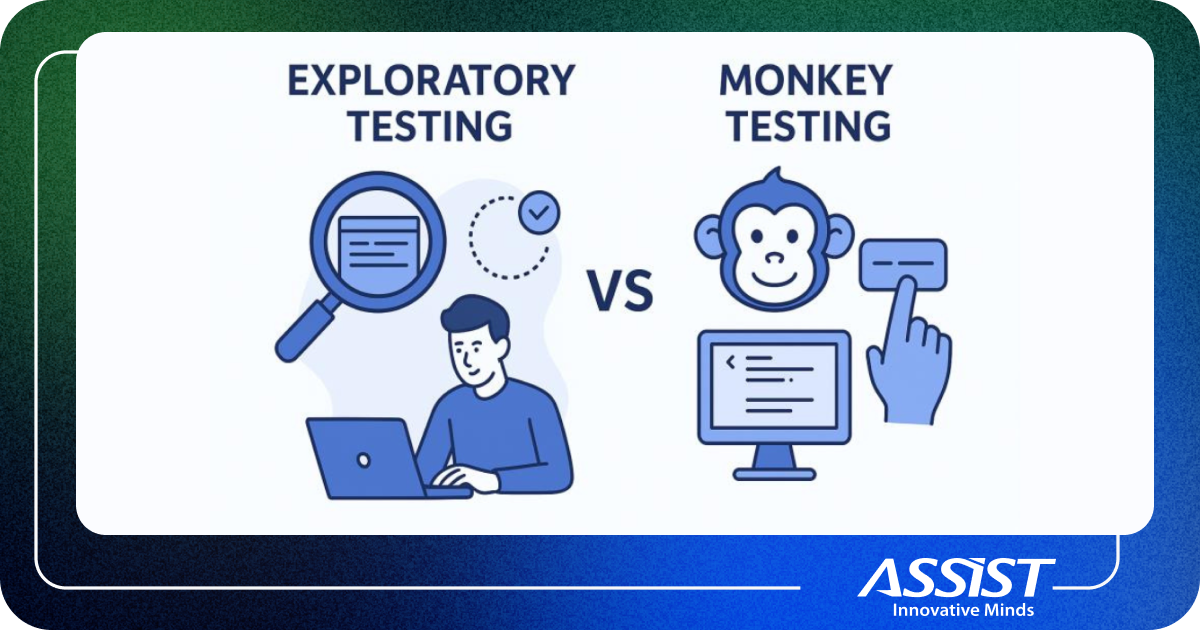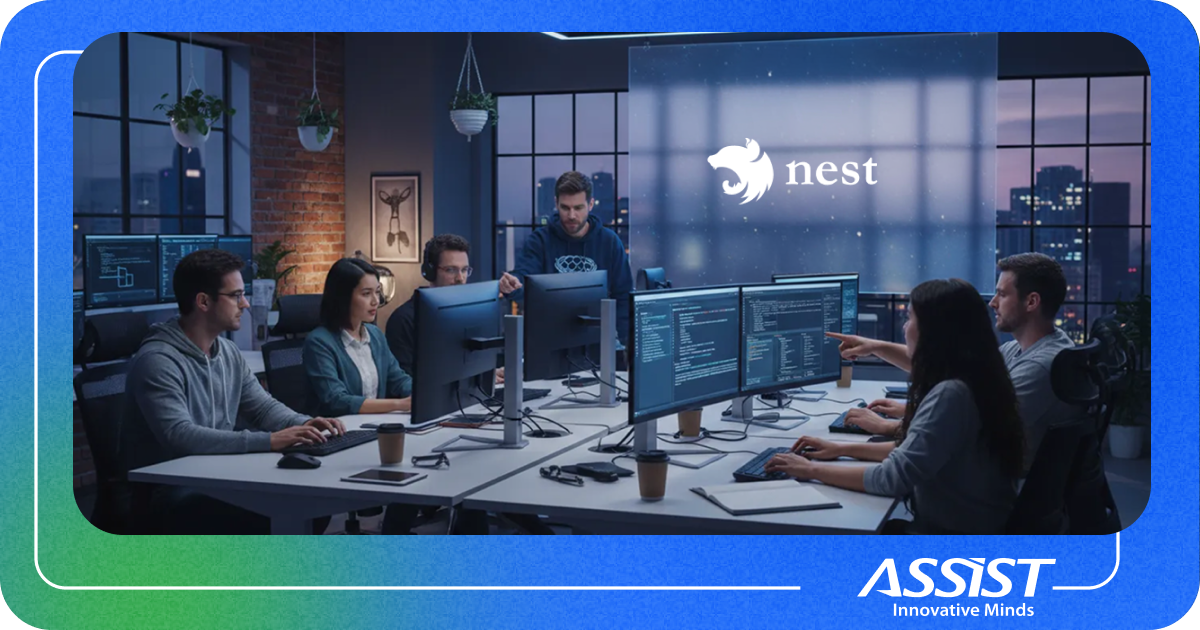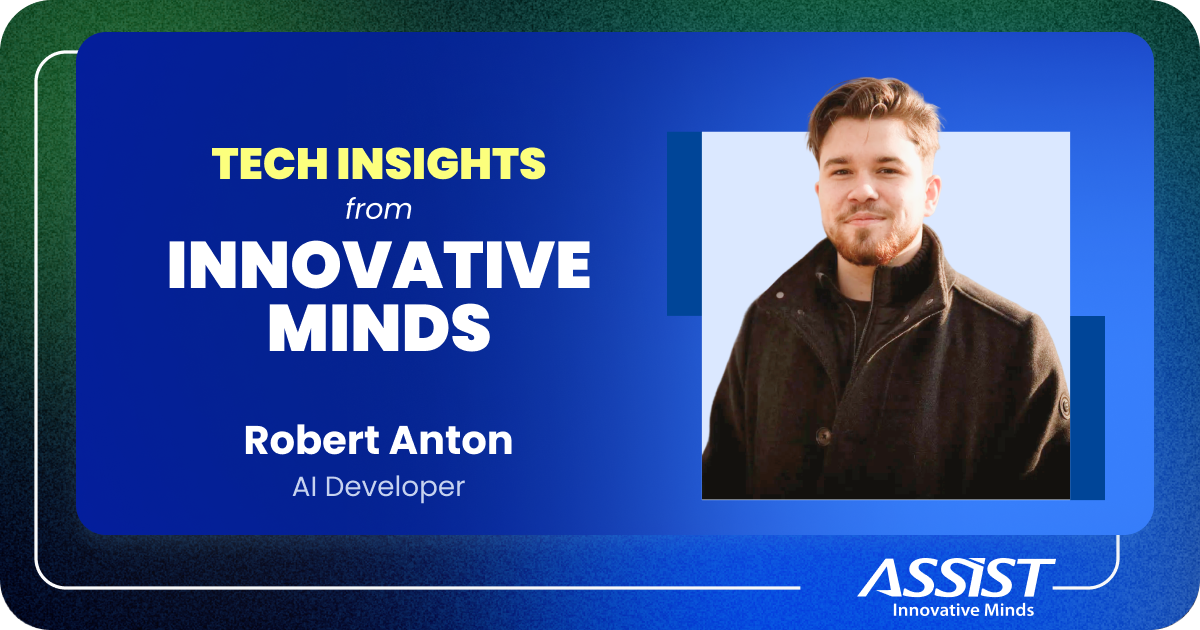Tech Insights from Innovative Minds: Eusebiu Candrea, Deputy of Mobile Department
1️⃣ Everyone's talking about 5G. However, what's the real game-changer once we start shifting toward 6G? How do you see that impacting mobile app development and business strategies?
2️⃣ AI is making its way into pretty much every smartphone now. From your perspective, how is this shaping user experiences, and what should companies be doing to capitalize on it?
3️⃣ Super-apps are becoming huge, especially in Asia. Do you think we'll see that same trend take off globally? And if so, how should businesses prepare for that kind of ecosystem shift?
4️⃣ AR and VR used to feel like hype, but now they're showing up in real products. Which industries do you think are best positioned to leverage these technologies through mobile?
5️⃣ What's your take on blockchain and crypto making their way into mobile payments? Is it just hype, or are we really heading toward a new standard in transaction security?
6️⃣ We're seeing more advanced biometrics in mobile apps, like facial recognition and behavioral data. Are these features just about security, or do they open up new UX opportunities, too?
7️⃣ Lately, there's been talk about AI assistants replacing traditional apps altogether. Do you think that's where we're headed? And if so, what does that mean for the way we design and build mobile solutions?
The value of a development-oriented mindset
For this new edition of Tech Insights from Innovative Minds, we sat down with Eusebiu Candrea, Deputy of the Mobile Department at ASSIST Software. With almost eight years of hands-on experience as an Android developer at our company, Eusebiu brings both in-depth technical insight and a sharp, product-oriented mindset to the table.
From building full-stack apps to leading open-source projects and mentoring junior developers, Eusebiu's career is a great example of what it means to connect engineering skills with strategic thinking. At ASSIST Software, he's known for his proactive mindset, openness to learning and development, and ability to handle complex tech and create scalable mobile products.
In this conversation, we dive into the evolution from 5G to 6G, the rise of super apps, on-device AI, and what blockchain, biometrics, and satellite internet really mean for the future of mobile development. Whether you're building apps, running a product team, or just curious about where the tech world is headed, this one's for you.

Eusebiu's Insights on Mobile Technologies
1️⃣ Everyone's talking about 5G. However, what's the real game-changer once we start shifting toward 6G? How do you see that impacting mobile app development and business strategies?
I've been an Android developer for over 7 years, and during this time, I've seen a lot of changes in the tech world. I remember when 4G LTE came around, some people were worried about radiation, but others understood the real opportunity of having a faster and more stable network. It allowed us to build mobile apps relying on streaming and cloud sync.
The real leap, though, came with 5G, not just because of higher speeds but because of lower latency and the ability to connect thousands of devices at once. From that point on, projects started to get much more interesting: IoT apps, smart city solutions, smoother AR/VR experiences, and so on.
For example, I worked on a mobile app for DJs and music producers that offered audio and video tutorials. In that case, 5G was key for delivering high-quality video without interruptions and enabling fast downloads for offline playback.
Looking around and seeing how far tech has come, I believe 6G will break even more limits. From what I've read, 6G won't just be "faster," but it will be a network that's smart by design. This will completely change how we build apps, thanks to integrated AI and near-zero latency.
As a mobile developer, I think 6G will mean that:
Apps will be able to use AI models directly from the network without using up local resources;
Ultra-low latency (< 1 ms) that could unlock new experiences in mobile gaming, AR/VR, or real-time collaboration between users;
Device-to-device communication. Imagine apps that don't rely on the cloud at all, and user devices could talk to each other directly;
With real-time data access, apps will be able to adjust based on user context instantly.
Besides all these developer-side benefits, 6G will also bring clear value for our clients around the world by enabling a new generation of "super apps." These will be faster, smarter, and more stable and can be launched globally faster, with lower costs for maintenance and scaling. In the long run, that means better ROI, higher user retention, and a real competitive advantage.
2️⃣ AI is making its way into pretty much every smartphone now. From your perspective, how is this shaping user experiences, and what should companies be doing to capitalize on it?
I still remember when everything was hardcoded, and AI wasn't even a topic. Now, we're clearly in the middle of a big shift where AI is becoming a core part of the mobile experience, from smart recommendations to on-device processing and intelligent automation.
For users, this means faster, more relevant apps that adapt in real-time, with more natural interactions and useful shortcuts. And for developers, it's exciting to see these features running directly on the device, with better speed and privacy.
For companies, I believe it's time to stop seeing AI as just a fancy extra and start using it as a practical tool to boost engagement and app value. When used right, AI can personalize the experience, simplify user journeys, and even run efficiently on-device, especially in apps where privacy or offline access matters.
3️⃣ Super-apps are becoming huge, especially in Asia. Do you think we'll see that same trend take off globally? And if so, how should businesses prepare for that kind of ecosystem shift?
Working on apps for clients from different countries and regions, I've noticed that their needs and expectations are slowly moving closer to the "super-app" concept, even if the trend is still growing more slowly in Europe and the US. In Asia, super-apps are already the norm, where a single app can handle payments, transport, shopping, and messaging.
In my opinion, super-apps will keep becoming more useful and necessary worldwide because users want one app that can do multiple things without switching between different services. And with AI and 6G, it's now possible to integrate more complex features without sacrificing performance.
For businesses, getting ready for this kind of ecosystem means:
Modular thinking – every feature should be built in a way that's easy to add or replace;
Focusing on performance and especially security – super important when dealing with sensitive data like payments, location, or messaging;
A unified experience: all components should feel like one system, not like separate tools stitched together.
Of course, there are also some downsides to this approach. For developers, it means more complexity, harder testing and maintenance, and the need for a scalable, modular architecture.
For clients, it usually requires a higher initial investment, bigger risks around security and GDPR, and the challenge of keeping the brand consistent across all modules.
4️⃣ AR and VR used to feel like hype, but now they're showing up in real products. Which industries do you think are best positioned to leverage these technologies through mobile?
A few years ago, AR and VR felt more like marketing gimmicks. Since then, the technology has matured, smartphones have become more powerful, and now we're seeing apps that bring real value.
For example, at ASSIST Software, my colleagues from the Unity team developed an app for a cosmetics company that allowed users to preview how a specific hair color would look on a virtual avatar. This kind of interactive experience really helps users make better buying decisions.
I believe retail, education, real estate, and healthcare are industries with huge potential for mobile AR/VR. What really matters today is that you no longer need expensive headsets because everything works directly on your phone. And with 5G (and eventually 6G), these experiences will become even smoother and more accessible.
5️⃣ What's your take on blockchain and crypto making their way into mobile payments? Is it just hype, or are we really heading toward a new standard in transaction security?
Blockchain and crypto in mobile payments sound promising due to transparency, distributed security, fast peer-to-peer transfers. But the truth is, a lot of these technologies come in waves: they're trendy for a while, then fade out if there's no real-world adoption or mobile ecosystem support.
We're already seeing some cool crypto wallets and other projects out there, but many are still in the niche. And in client discussions, FOMO (fear of missing out) often shows up more than an actual business need.
I think the future of mobile payments won't be just crypto or fiat but a mix. Blockchain has potential, but to become a true standard, it needs to deliver an experience just as simple and reliable as current systems. In app development, trust and stability usually matter more than hype.
6️⃣ We're seeing more advanced biometrics in mobile apps, like facial recognition and behavioral data. Are these features just about security, or do they open up new UX opportunities, too?
Since the first advanced phone unlocking method using fingerprints, things have come a long way. Now, we have facial recognition and even behavioral analysis. At first, biometrics were all about security, and that's still important, but what's becoming clearer is that they can also deliver smoother and more personal user experiences.
From a UX perspective, biometrics simplify access by removing the need for passwords, personalizing the interface based on who's using the device, and helping apps adapt in real time to the user's context and behavior.
7️⃣ Lately, there's been talk about AI assistants replacing traditional apps altogether. Do you think that's where we're headed? And if so, what does that mean for the way we design and build mobile solutions?
There's more and more talk these days about AI replacing jobs and even fully replacing traditional apps. Personally, I don't think that will really happen, but I do believe it will change how apps are built. I see AI as a powerful and helpful tool – something both people and developers can use to make their work easier and more efficient.
AI assistants will probably become more of an interface layer. For example, if I want to order a coffee or book a ticket, I might not need to open an app and search for it manually anymore, as I could just ask my assistant to do it for me.
That means for us developers, the challenge is shifting:
From building screens to building capabilities and logic that AI can use;
We'll need to start thinking of apps as modular services exposed through smart APIs, not just nice-looking UIs;
We'll also have to include conversational design and support for multi-modal interactions (voice, text, gestures, etc.).
The value of a development-oriented mindset
From a professional standpoint, Eusebiu's expertise extends far beyond coding. He's a T-shaped engineer with a deep mastery of mobile technologies and a broad understanding of backend, frontend, and product strategy.
His leadership in driving scalable, modular architectures and delivering user-centric, innovative mobile solutions has consistently elevated client projects to new heights. Whether it's spearheading open-source initiatives or mentoring teams, Eusebiu's strategic vision and execution create real business value.
Ready to future-proof your mobile strategy? Connect with us to explore how our Mobile Department can help you build smarter, faster, and more adaptive apps.




